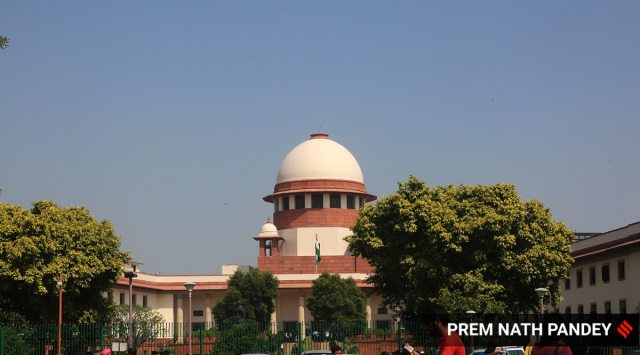Will first decide on constitutional validity of Citizenship Act’s Section 6A: Supreme Court
Section 6A deals with “special provisions as to the citizenship of persons covered by the Assam Accord”.
 Section 6A was introduced in 1985 following the signing of the Assam accord between the Government of India and agitating groups in the state. (Express file photo by Prem Nath Pandey)
Section 6A was introduced in 1985 following the signing of the Assam accord between the Government of India and agitating groups in the state. (Express file photo by Prem Nath Pandey) The Supreme Court Constitution Bench while hearing petitions challenging Section 6A of the Citizenship Act said Tuesday it will first decide whether the provision is constitutionally valid before proceeding to other issues raised in the pleas.
“Presently, the following issue as framed for primary determination for the Constitution Bench, whether section 6A of the Citizenship Act, 1955, suffers from any constitutional infirmity,”, Chief Justice of India D Y Chandrachud, who was presiding over the five-judge Constitution Bench, said.
The bench, also comprising Justices M R Shah, Krishna Murari, Hima Kohli and P S Narasimha, said it will take up the matter once it completes hearing the petitions arising out of the split in the Shiv Sena and subsequent developments in Maharashtra. The bench will start hearing the Maharashtra matter from February 14.
Section 6A deals with “special provisions as to the citizenship of persons covered by the Assam Accord”. It says that all those who came to Assam on or after January 1, 1966, but before March 25, 1971, from the specified territory (it includes all territories of Bangladesh at the time of commencement of the Citizenship (Amendment) Act, 1985), and since then are residents of Assam, must register themselves under Section 18 for citizenship.
The provision was introduced in 1985 following the signing of the Assam accord between the Government of India and agitating groups in the state.
Appearing for the Centre Tuesday, Solicitor General Tushar Mehta urged the court to also look into another issue approved by the Attorney General, which is “whether the Assam accord, a memorandum of settlement between Union of India, the State of Assam, All Assam Students Union, and All Assam Gana Sangram Parishad arrived at for resolving a long pending issue, being a political settlement and a matter of great policy importance can at all be judicially reviewed at this stage as courts will decline to enter into the political thicket and annul matters of such magnitude and immense consequences”.
The CJI pointed out it’s an argument supporting Section 6A. He said, “Therefore, we take it that your argument is that 6A is valid. Additionally, of course, it’s not constitutional ultra vires, but it’s valid also for the reason that when the government has enacted a statute to give effect to an accord… Therefore, this provision should be upheld… So, this is really an additional argument in support of your submission that 6A is valid. You can argue that when the matter is taken up”.
The bench said the fact that it has framed a preliminary question does not prevent it from looking into other issues as well once it starts the regular hearing.







